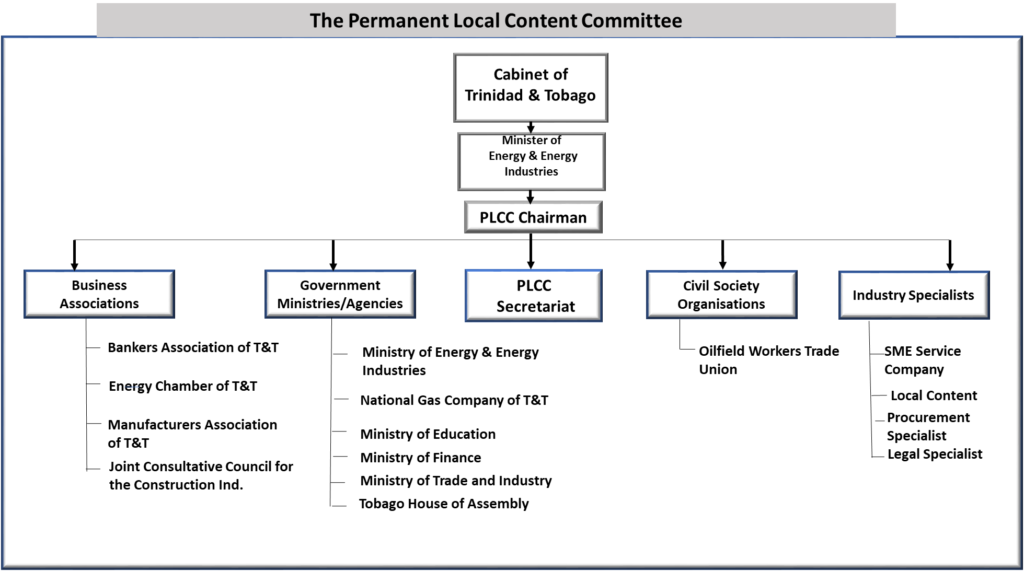Mission
To oversee and report on the implementation of the Local Content and Local Participation Policy framework by maximizing the level of participation of the nation’s people, enterprises, technology and capital through the development and increased use of locally owned businesses, local financing and human capabilities, in the conduct of all activities connected with the energy sector, along its entire value chain at home and abroad.
The Permanent Local Content Committee

The Permanent Local Content Committee was initially constituted in March 2004, and reinstituted in 2016 after a period of inactivity, in accordance with the Local Content and Local Participation Policy & Framework for the Republic of Trinidad and Tobago energy sector.
The Permanent Local Content Committee is multi-sectoral, representing major stakeholders involved in capacity building, procurement and support for small & medium enterprises (smes) in the sector. It is currently led by Chairman Mr. Anthony Paul and is supported by representatives from government ministries, business associations, industry specialists and civil society organisations.
The Permanent Local Content Committee Secretariat
The Permanent Local Content Committee Secretariat provides administrative, operational and technical support (inclusive of intelligence gathering, research, analysis and communications) to the Chairman of the Permanent Local Content Committee, to ensure that the committee functions effectively and efficiently.
The work of the Permanent Local Content Committee Secretariat is directed and monitored by the Permanent Local Content Committee. This includes setting a programme of work, deliverables, priorities and timelines. The day-to-day work of the Permanent Local Content Committee Secretariat, inclusive of management of the work programme and personnel is the responsibility of the head of the Permanent Local Content Committee secretariat. The head of the Permanent Local Content Committee Secretariat reports to the Permanent Local Content Committee via its chairman.
Function
The Permanent Local Content Committee:
- Provides strategic and technical advice and assistance to the Ministry of Energy and Energy Industries in its role of managing the petroleum sector for the maximum benefit to the people of Trinidad and Tobago, via implementation of the provisions of the Local Content and Local Participation Policy for the petroleum sector.
- Provides assistance to the government and country in fulfilling their vision of maximising local content, participation and value addition and retention.
- Ensures the application of and adherence to the Policy by continually and closely monitoring activities generated in the energy sector to ensure that all projects include opportunities for the development of the expertise of nationals and maximise the level of local content and local participation.
- Creates an enabling environment aimed at increasing local private sector participation in all areas of the value chain from upstream to further downstream through implementation of its objectives.
Objectives
The objectives of the reconstituted Permanent Local Content Committee are encapsulated in its Terms of Reference (TOR) as follows:
- To review the policy document on local content and local participation with specific recommendations on the desired levels of local content to be contained in energy sector projects;
- To devise strategies to increase local content and local participation in all energy sector projects;
- To liaise with all stakeholders to promote local content;
- To prepare a list of activities involved in projects that ought to have specified levels of local content over the short, medium and long term;
- To review definitions and terms to determine a benchmark for local content, for example, local company;
- To liaise with the work permit committee of the ministry of energy and energy industries to ascertain the national requirements for the recruitment, training and development of local staff and the transfer of knowledge and the transfer of technology to the services sector;
- To investigate projects in which imported technology could be unbundled and devise mechanisms to ensure local companies are contracted;
- To monitor the infrastructure needs (gas, water and electricity) to facilitate and improve the local content capability, for example, fabrication yards and industrial estates.
- To establish an appropriate methodology for monitoring the achievement of local content targets.
- To compare the cost of goods and services offered and contracted by the international companies in relation to local businesses
- To undertake all other activities that could assist the committee in carrying out its mandate.